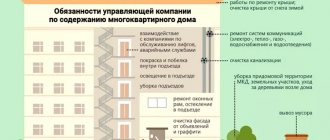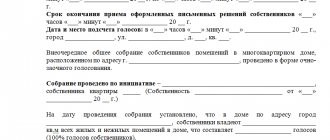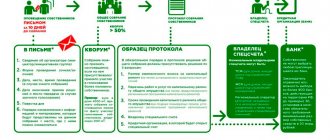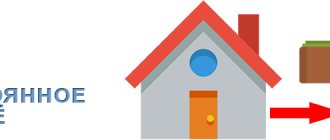Violation of the procedure for notification of an upcoming meeting
The first step to holding a general meeting of owners is to notify the owners of the upcoming event. The initiator must notify all owners of premises in the apartment building about the meeting no later than 10 days before its start (part 4 of article 45 of the Housing Code of the Russian Federation).
The main mistake that meeting initiators make is choosing the notification method. The most popular way to inform owners about an upcoming meeting is to place a notice on information boards or on the doors of apartment building entrances.
According to 4 tbsp. 45 of the Housing Code of the Russian Federation, it is possible to inform the owners about the OSS in this way only if the decision on this was made by the owners at one of the previously held meetings. If the decision to notify the owners of the premises by posting notices was not made, the initiator of the meeting within ten days sends a registered letter to each owner or delivers a notification to each owner personally against signature.
Please pay attention to the contents of the OSS message. According to Part 5 of Art. 45 of the RF Housing Code it must contain:
- information about the initiator of the meeting;
- form of the meeting;
- date, place, time. If the OSS is carried out in absentia or in absentia, please also indicate the closing date for accepting decisions of the owners and the address where such decisions should be transferred;
- agenda;
- the procedure for familiarizing yourself with meeting materials and the place where owners can do this.
Ministry of Construction of the Russian Federation on holding a general meeting of owners in the apartment building
498284
Article 45 of the RF Housing Code. The procedure for holding a general meeting of premises owners in an apartment building
Article 45 of the Housing Code of the Russian Federation with comments and amendments for 2020-2021.
1. Owners of premises in an apartment building are required to annually hold an annual general meeting of owners of premises in an apartment building. Unless otherwise established by the general meeting of owners of premises in an apartment building, the annual general meeting of owners of premises in an apartment building is held during the second quarter of the year following the reporting year, in the manner established by this article.
2. General meetings of owners of premises in an apartment building held in addition to the annual general meeting are extraordinary. An extraordinary general meeting of owners of premises in an apartment building may be convened at the initiative of any of these owners.
3. The general meeting of owners of premises in an apartment building is valid (has a quorum) if the owners of premises in this building or their representatives with more than fifty percent of the votes of the total number of votes took part in it. If there is no quorum for holding an annual general meeting of owners of premises in an apartment building, a repeat general meeting of owners of premises in an apartment building must be held.
3.1. The management organization, the board of a homeowners' association, a housing or housing-construction cooperative, or another specialized consumer cooperative are required to maintain a register of owners of premises in an apartment building, which contains information that allows identifying the owners of premises in a given apartment building (last name, first name, patronymic (if any) the owner of the premises in an apartment building, the full name and main state registration number of the legal entity, if the owner of the premises in an apartment building is a legal entity, the number of the premises in the apartment building, the owner of which is an individual or legal entity), as well as information on the size of their shares in the right of common ownership of the common property of the owners of premises in an apartment building. Upon receipt by the management organization, the board of a homeowners' association, housing or housing-construction cooperative, or other specialized consumer cooperative, appeals in writing, including appeals using the system, the owner or other person specified in this article, on whose initiative a general meeting is convened meeting of owners of premises in an apartment building, on the provision of a register of owners of premises in an apartment building, these persons are obliged to provide the owner or other person specified in this article with this register within five days from the date of receipt of such an application. The consent of the owners of premises in an apartment building to the transfer of personal data contained in the register of owners of premises in an apartment building, when providing this register in the manner established by this part, for the purpose of convening and organizing a general meeting of owners of premises in an apartment building is not required.
4. The owner, another person specified in this Code, on whose initiative a general meeting of owners of premises in an apartment building is convened, is obliged to inform the owners of premises in this building about the holding of such a meeting no later than ten days before the date of its holding. Within the specified period, a message about holding a general meeting of owners of premises in an apartment building must be sent to each owner of the premises in this building by registered mail, unless the decision of the general meeting of owners of premises in this building provides for another way of sending this message in writing, or delivered to each owner of the premises in this house under signature or placed in the premises of this house, determined by such a decision and accessible to all owners of premises in this house.
5. The notice of holding a general meeting of owners of premises in an apartment building must indicate:
- 1) information about the person on whose initiative this meeting is convened;
- 2) the form of holding this meeting (in-person, absentee or absentee voting);
- 3) the date, place, time of this meeting or, if this meeting is held in the form of absentee voting, the closing date for accepting decisions of owners on issues put to vote, and the place or address where such decisions should be transferred;
- 4) the agenda of this meeting;
- 5) the procedure for familiarizing yourself with the information and (or) materials that will be presented at this meeting, and the place or address where they can be viewed.
6. Owners who have at least ten percent of the votes of the total number of votes of the owners of premises in an apartment building have the right to apply in writing to the management organization or the board of a homeowners’ association, housing or housing-construction cooperative, or other specialized consumer cooperative to organize a general meetings of owners of premises in an apartment building. The application for holding a general meeting of owners of premises in an apartment building must formulate the issues to be included on the agenda of the meeting. At the request of the owners, the management organization, the board of a homeowners' association, housing or housing-construction cooperative, or other specialized consumer cooperative are obliged to carry out the activities necessary for holding a general meeting of owners of premises in an apartment building within forty-five days from the date of receipt of the application, but no later than than ten days before the date of the general meeting, notify each owner of the premises in this house about the holding of this general meeting in the prescribed manner, as well as draw up the necessary documents based on the results of this general meeting and ensure that they are brought to the attention of the owners of the premises in this house in the prescribed manner established by Part 3 of Article 46 of this Code.
7. A general meeting of owners of premises in an apartment building may be convened on the initiative of the management organization managing this apartment building under a management agreement. At the same time, the agenda of such a meeting may include issues referred by this Code to the competence of the general meeting of owners of premises in an apartment building.
Incorrect execution of owner decisions
If you are holding a meeting in person, in absentia or in absentia, collect from the owners written decisions on the issues put to vote (parts 4.1 - 5.1 of Article 48 of the Housing Code of the Russian Federation). Please pay attention to what information needs to be included in decisions, in accordance with Part 5.1 of Art. 48 Housing Code of the Russian Federation:
- information about the person participating in the vote;
- details of the document confirming the ownership of the premises of the person participating in the vote;
- decisions on each issue on the agenda, expressed in terms of “for”, “against”, “abstained”.
If the owner did not mark a single position in any of the issues on the agenda, or, on the contrary, put several ticks on it, such an issue in this decision should be considered invalid and not taken into account when summing up the results of the meeting (Part 6 of Article 48 of the Housing Code of the Russian Federation ).
On the election of the chairman of the general meeting of owners
6284610
Incorrect vote count
The presence of a quorum on agenda items and the outcome of the meeting directly depend on the counting of votes at the general meeting of owners of premises in an apartment building.
Incorrect vote counting is caused by incorrectly executed decisions of owners or unreliable data on the ownership of premises in an apartment building.
In addition, errors in counting votes arise due to such a concept as shared ownership. The number of votes of participants in shared ownership must correspond to their shares in the right to living space.
If one person or legal entity owns several premises in an apartment building, he can vote only once. At the same time, the ballot indicates the total area of the premises that belong to such a person.
Execution of decisions of the OSS
We never tire of repeating after Part 1 of Art. 161 of the Housing Code of the Russian Federation, that the management of an apartment building must ensure favorable and safe living conditions in it. The management authority must try to maintain the common property in the house in proper condition and provide high-quality utilities.
The company that manages the apartment building is responsible to the owners for the provision of services and performance of work on the maintenance of the common property of the house (Part 2.3 of Article 161 of the Housing Code of the Russian Federation).
Under the management agreement, the management company, on the instructions of the owners, within the agreed time frame and for a fee, provides services and performs work on the maintenance and repair of common property and provides utilities (Part 2 of Article 162 of the Housing Code of the Russian Federation).
All owners of premises in an apartment building, on the right of common shared ownership, own common property in an apartment building (clause 1, part 1, article 36 of the Housing Code of the Russian Federation). Common property includes:
- inter-apartment landings,
- stairs,
- elevators,
- elevator shafts,
- corridors,
- technical floors,
- attics and basements.
To ensure that all listed premises are maintained in proper order, the owners approve at a general meeting a list of services and works, the conditions for their provision and implementation, and the amount of financing (clause 17 of the Rules approved by Decree of the Government of the Russian Federation of August 13, 2006 N 491).
Payment for residential premises and utilities includes fees for the maintenance and repair of residential premises. This also includes payment for services and work on managing an apartment building, maintenance, routine repairs of common property in an apartment building, a contribution for major repairs and fees for utilities (Part 2 of Article 154 of the Housing Code of the Russian Federation).
The amount of payment for the maintenance and repair of residential premises in an apartment building is determined by the general meeting of owners. It is determined taking into account the proposals of the management company for at least one year (Part 7, Article 156 of the Housing Code of the Russian Federation).
It turns out that the competence of the general meeting of premises owners includes resolving the issue of determining the list of services and works for the management of apartment buildings for the maintenance of the common property of the house. The management company provides such services and work as payment for residential premises.
Recognition of the OSS decision as void
165353
Incorrectly executed powers of attorney
When the owner does not have the opportunity to take part in the vote, his representative can vote for him by proxy. Before allowing a representative to participate in the OSS, make sure that the power of attorney is drawn up correctly and contains information about the owner and his representative:
- surname, name, patronymic - for individuals, full name - for legal entities;
- place of residence or location;
- passport documents or details of constituent documents.
The power of attorney for voting must be executed in accordance with clauses 3 and 4 of Art. 185.1 of the Civil Code of the Russian Federation or certified by a notary. According to paragraphs 3 and 4 of Art. 185.1 of the Civil Code of the Russian Federation, a power of attorney does not need to be notarized if the document:
- certified by the organization in which the principal works or studies;
- issued by the administration of the inpatient medical institution in which the principal is undergoing treatment.
How to check the power of attorney for participation in the general meeting of owners
155487
Error in selecting meeting form
The forms for holding general meetings of owners are listed in Art. 44.1 Housing Code of the Russian Federation. There are three of them: full-time, part-time and part-time.
It happens that the initiator indicates in the notification that the meeting will be in person. Few owners come to the meeting and a quorum is not reached. Then the initiator decides to conduct the correspondence part. At the same time, he does not notify the owners about the absentee part and draws up one protocol for both parts. This is the wrong approach. If the requested in-person meeting does not take place, a separate absentee meeting may be held. At the same time, the owners must be notified about it and a separate protocol must be drawn up (Part 1, Article 47 of the Housing Code of the Russian Federation).
The advantage of the in-person/absentee form is that some of the owners will be able to discuss problems in person with the initiator, and in the absentee part you will gain the missing votes. With this form of meeting of owners, there will be no need to notify each part separately and only one protocol will have to be drawn up.
Actions of the management company if the owners entrusted it with organizing the meeting
The owners contacted the management organization and entrusted it with organizing the general meeting. They provided the agenda for the upcoming meeting. First of all, the MA resolves all organizational issues:
1. Determines the form of the meeting.
According to Art. 44.1 of the Housing Code of the Russian Federation, general meetings of owners can be held in person, in absentia and in absentia.
2. Determines the timing of the meeting.
The management authority agrees on such a period with the owners who contacted it to organize the OSS. When agreeing on deadlines, you need to take into account the time it will take to notify owners.
3. Informs the owners about the meeting.
All owners of residential and non-residential premises in apartment buildings must be notified of the upcoming event at least ten days before the date of its holding (Part 4 of Article 45 of the Housing Code of the Russian Federation).
4. Compiles ballots in accordance with the register of owners of premises in the apartment building.
The responsibility of the management authority to maintain a register of owners of premises is determined by Part 3.1 of Art. 45 Housing Code of the Russian Federation.
When the documents for the meeting are prepared and the owners of the premises in the apartment building are informed about the upcoming event, you can begin to hold it.
On the election of the chairman of the general meeting of owners
6284610
Outdated information about ownership of premises
Make sure that the register of premises owners reflects current information. Owners do not always provide the management organization with up-to-date data on changes in ownership of real estate properties and changes in the area of premises.
To ensure that the data is correct, apply for extracts from Rosreestr, which stores current information about the owners of premises in apartment buildings. Then you will not have problems counting votes.
What to do if the Rosreestr and MA data do not match
160243
Court opinions on the competence of the OSS
At an extraordinary general meeting, the owners of premises in the apartment building decided to install a video surveillance system in the house, determined the payment procedure and approved the service tariff. There was a quorum at the OSS and none of the owners challenged the minutes of the meeting.
No one except one. This owner filed a lawsuit against the management company, demanding that it return the money spent on video surveillance services to him, and also compensate for moral damages.
The courts' opinions were divided. The magistrate's court did not satisfy the claim. The Court of Appeal overturned this decision, declared the charging of payments for installation and maintenance of cameras illegal, ordered the management company to recalculate, compensate the owner for moral damages and pay a fine.
The Presidium of the Supreme Court of the Republic canceled the requirement for recalculation, but said that a fine and compensation for moral damage would still have to be paid. The management company appealed to the Supreme Court of the Russian Federation. And the Supreme Court of the Russian Federation again reconciled everyone.
On the election of the chairman of the general meeting of owners
6284610
Violation of the procedure for transferring documents to the Civil Housing Inspectorate
In accordance with clause 3.1, part 3, art. 45 of the Housing Code of the Russian Federation, the managing organization, homeowners' association, residential complex, housing cooperative, within 5 days from the date of receipt of the decisions and minutes of the general public association from the initiator of the meeting, must send the originals of the minutes of the meeting and decisions to the GZhN body. Then their electronic images need to be placed in the GIS housing and communal services.
A common mistake made by management bodies, homeowners' associations, residential complexes, and housing cooperatives is that they submit documents to the housing authority body on time, but do not post information about the meeting in the system. For failure to post information, you can receive a fine under Art. 13.19.2 Code of Administrative Offenses of the Russian Federation.
Notification of owners and public housing estates about the results of the general meeting of owners
6260012
Holding meetings with a similar agenda
When the owners are dissatisfied with the decision of the meeting, they decide to hold a new one on similar issues as quickly as possible in order to change the previous one. The management company does not oppose this. But this can lead to negative consequences for the organization.
If, within three months, the GZHI receives two or more minutes of meetings of one MKD, containing decisions on similar issues on the agenda, the GZHI body is obliged to conduct an unscheduled inspection in order to establish the fact of compliance with legal requirements when organizing, holding and documenting the results of such a meeting.
Changing the agenda
It happens that during a meeting an issue arises that the owners want to discuss, and it is additionally included in the agenda. It is prohibited to do this, according to Part 2 of Art. 46 Housing Code of the Russian Federation. During the meeting, decisions cannot be made on issues not included in the agenda, nor can the agenda of the meeting be changed.
If issues raised during the meeting are important, write them down and put them on the agenda for the next meeting.
What issues can be resolved by the general meeting of owners?
3653510
Competencies of the OSS according to the law
The management company installed and began to maintain a video surveillance system at the entrance, because it fulfilled the wishes of the owners of the premises in the apartment building. They expressed their desire at a general meeting of home owners.
The Court of Appeal, imposing a severe penalty on the management company, proceeded from the fact that video surveillance is an additional service that a management company can provide to owners. Additional services do not relate to services for the maintenance of residential premises and utilities, and therefore do not fall within the competence of the OSS.
The cassation court supported this position and agreed with the nullity of the OSS decision. The Supreme Court of the Russian Federation explained that this is wrong.
The general meeting of owners of premises in an apartment building is the management body of an apartment building (Part 1 of Article 44 of the Housing Code of the Russian Federation). Its competence includes issues provided for in Part 2 of Art. 44 Housing Code of the Russian Federation:
- on the reconstruction of apartment buildings, construction of outbuildings, major repairs;
- on the limits of use of the land plot;
- on the use of common property of the house by third parties;
- about choosing a control method.
Decisions of the OSS on issues that are put to a vote are made by a majority vote of the total number of votes. There are a number of issues for which it is necessary to obtain at least two-thirds of the votes of the total number of votes of the owners of premises in the apartment building (Part 1 of Article 46 of the Housing Code of the Russian Federation).
The decision of the OSS on issues that fall within its competence is mandatory for all owners of premises in such a house, even for those who did not participate in the vote (Part 5 of Article 46 of the Housing Code of the Russian Federation).
Post-release of the webinar “OSS 100%. We have a successful meeting"
66612




